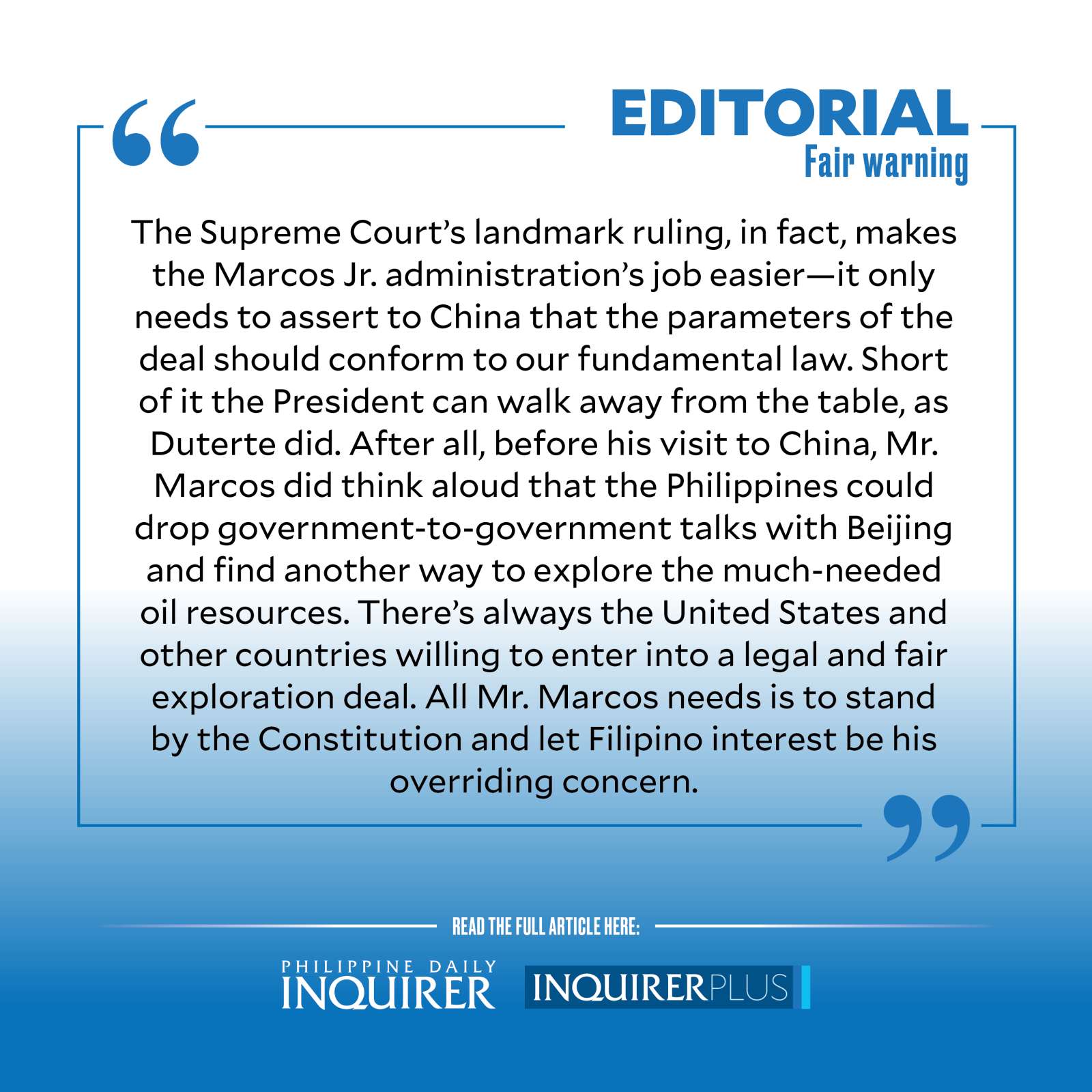Fair warning
 A Supreme Court ruling that declared as unconstitutional a 2005 joint exploration at the West Philippine Sea, has somehow dampened the new administration’s euphoria following President Marcos Jr.’s first state visit to China earlier this month.
A Supreme Court ruling that declared as unconstitutional a 2005 joint exploration at the West Philippine Sea, has somehow dampened the new administration’s euphoria following President Marcos Jr.’s first state visit to China earlier this month.
One of the highlights of Mr. Marcos’ visit was China President Xi Jinping’s statement that Beijing was ready to resume talks on oil and gas exploration at the West Philippine Sea, which were shut down by the Duterte administration over constitutional issues. In response, Mr. Marcos told Xi he “would very much like” to be able to announce that the Philippines and China would continue the halted negotiations, and that “these negotiations will bear fruit.”
“… [T]he pressure (is) upon not only China, not only the Philippines, but the rest of the world to move away from the traditional fronts of power,” Mr. Marcos said.
The news was welcomed by government and private sector proponents pushing to tap the rich resources believed to be lying under the seabeds within the country’s 370-kilometer exclusive economic zone in the West Philippine Sea. Finding new sources of oil and gas has acquired urgency amid the spiraling prices of oil caused by global disruptions, including Russia’s invasion of Ukraine, and the expected depletion by 2027 of the Malampaya natural gas field off the coast of Palawan.
But just as the two countries were preparing to start the ball rolling, the Philippine Supreme Court issued a ruling on a previous West Philippine Sea exploration agreement, which is likely to affect the planned new talks.
The high court declared as unconstitutional the 2005 Joint Marine Seismic Undertaking (JMSU) which allowed oil companies of China and Vietnam to explore oil resources in the West Philippine Sea. Former Bayan Muna representatives Satur Ocampo, Teodoro Casiño, and five others petitioned against it for violating the Philippine Constitution’s provision that the exploration, development, and utilization of the country’s natural resources should be under the full control and supervision of the state, and are reserved for Filipino citizens or corporations that are 60 percent owned by Filipinos.
The high court agreed—and ruled that the JMSU was unconstitutional and void for allowing wholly owned foreign corporations to participate in the exploration of the country’s resources, without observing the safeguards laid down by the Constitution.
The agreement, signed in 2005 under the administration of President Gloria Macapagal Arroyo, expired in 2008.
But Casiño is right in pointing out that the Supreme Court’s ruling was as “relevant as ever” in view of Mr. Marcos’ plan to enter into an exploration deal with China.
“May this be a warning to Mr. Marcos not to trifle with the constitutional provisions that reserve the exploitation of our natural resources exclusively to Filipinos and under the full supervision and control of the Philippine government,” Casiño said.
While all is not lost for the Marcos Jr. administration, the high court’s ruling should serve as fair warning and stern reminder to conduct these activities in accordance with the Constitution.
It may serve the Marcos Jr. administration well to scrap all the terms discussed under the Arroyo and Duterte administrations and start with a clean slate—putting as nonnegotiable the mandate of the Constitution as upheld by our highest court. It could learn from the reasons that prompted the Chinese-friendly Duterte administration to “completely terminate” the negotiations just days before it exited Malacañang in June 2022.
Then Foreign Secretary Teodoro Locsin Jr. said getting oil and gas resources was critical but “not at the price of sovereignty, not even a particle of it.”
Despite this dramatic pronouncement, the Duterte administration had not been transparent about the details of its negotiations with China, particularly about how the deal impacts the Philippine sovereignty and sovereign rights in the West Philippine Sea amid Beijing’s belligerent claims, as well as the management of the project and the sharing scheme.
It’s about time the new talks are conducted in a transparent manner, to prevent a repeat of the Arroyo era negotiations that, despite a belated high court ruling, has been found to be unconstitutional.
The Supreme Court’s landmark ruling, in fact, makes the Marcos Jr. administration’s job easier—it only needs to assert to China that the parameters of the deal should conform to our fundamental law.
Short of it the President can walk away from the table, as Duterte did. After all, before his visit to China, Mr. Marcos did think aloud that the Philippines could drop government-to-government talks with Beijing and find another way to explore the much-needed oil resources.
There’s always the United States and other countries willing to enter into a legal and fair exploration deal. All Mr. Marcos needs is to stand by the Constitution and let Filipino interest be his overriding concern.




















